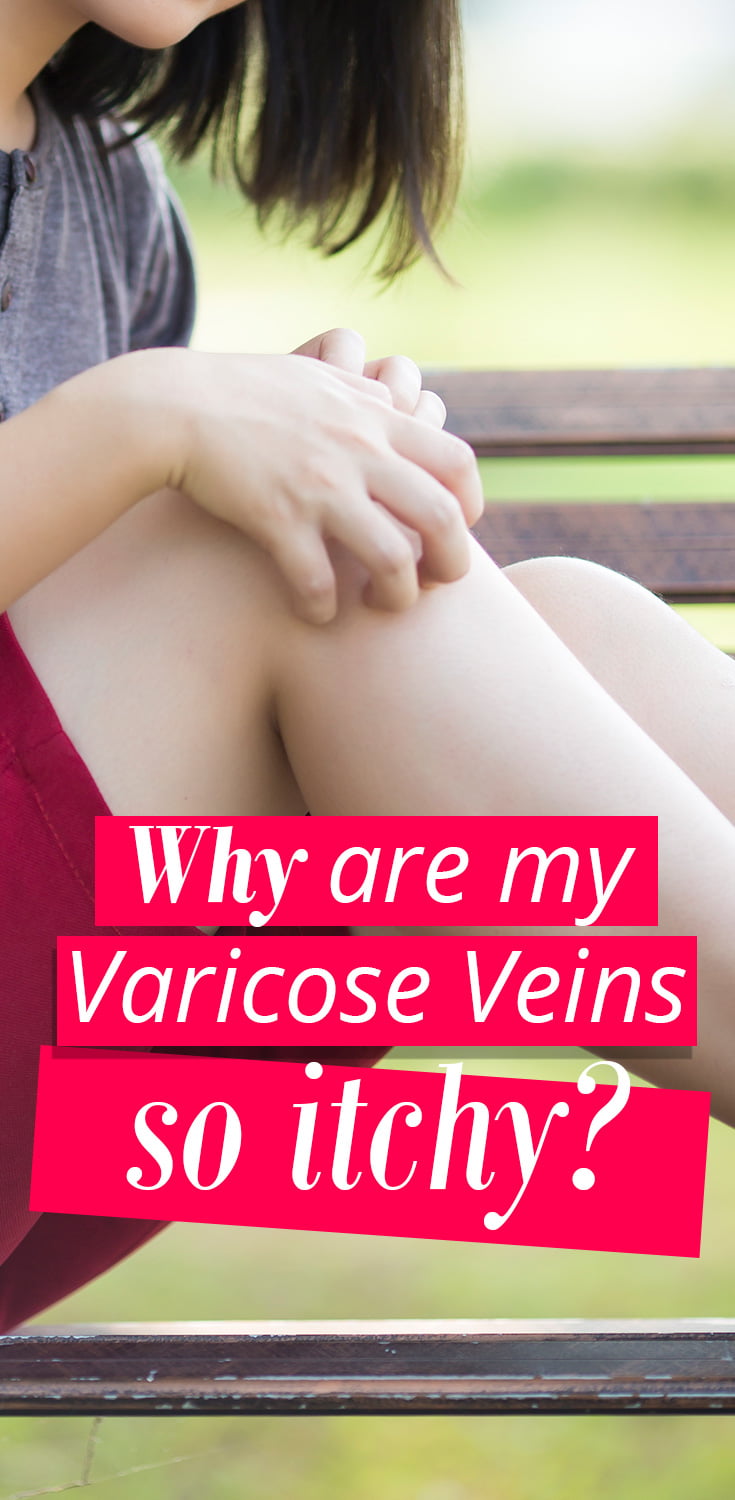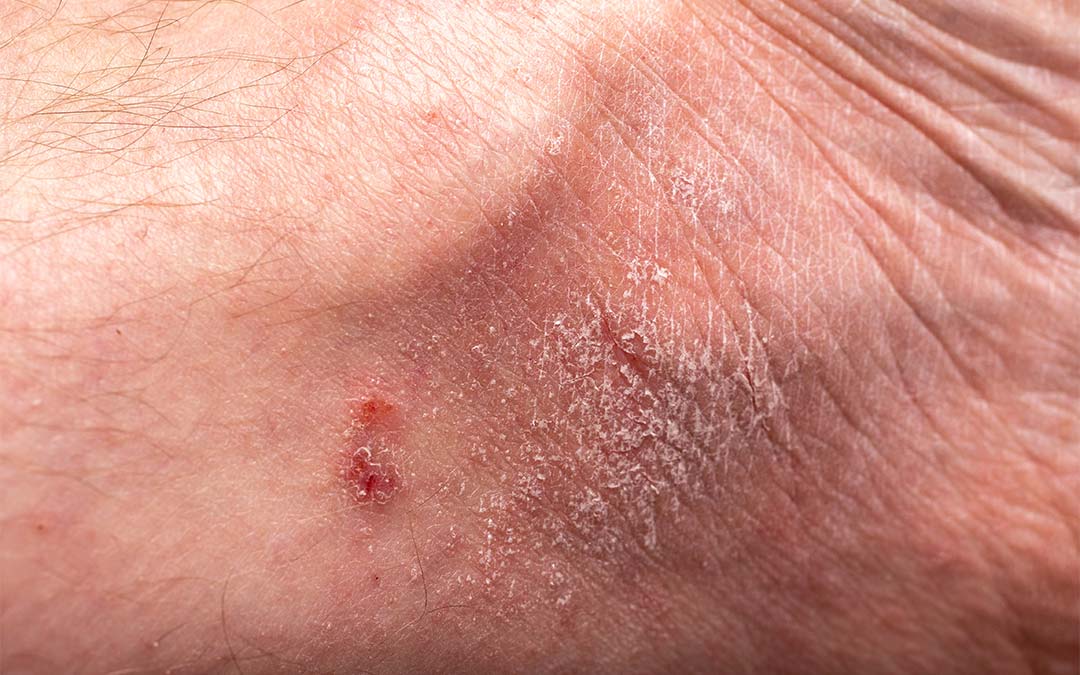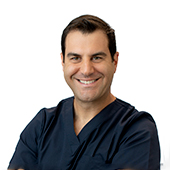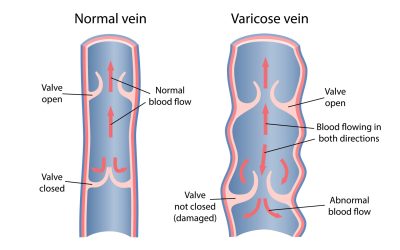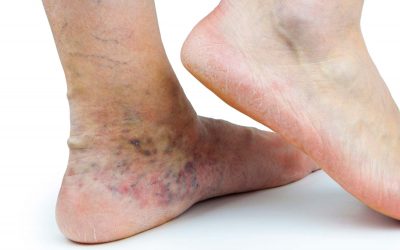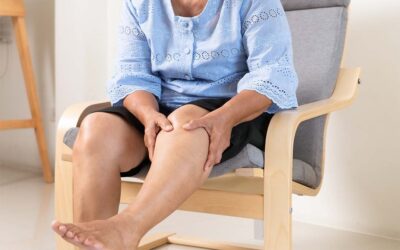For some people, having itchy varicose veins is the first time they noticed their prominent veins could be more than just a cosmetic problem. Itchy varicose veins are one of several symptoms of venous insufficiency that may signal you have venous eczema (also known as venous stasis dermatitis, venous dermatitis, or varicose eczema). This is a sign of chronic venous disease and a good indication it’s time to do something about your veins.
What are varicose veins?
Varicose veins or venous insufficiency occurs when veins do not efficiently return blood to the heart from the extremities. Our veins move blood flow in one direction toward the heart thanks to one-way valves in the vein walls (as opposed to arteries, which take blood in one direction, away from the heart to the extremities). When veins cease to work well, blood can leak backward, build up pressure in the blood vessel, and bulge out on the skin as blue or purple veins. They can also occur deeper under the skin, not visible on the surface, but can still bring with them the other symptoms of vein disease.
Venous hypertension
As the blood continues to pool in the veins, day in and day out, this causes an increase in the pressure within the varicose veins and subsequently the small capillaries on the surface of our skin, which are connected to the varicose veins. This increase in pressure is referred to as venous hypertension (an increase in blood pressure) and is a fundamental cause of inflammation and dermatitis/eczema seen in venous disease.
Venous eczema
Venous hypertension or increase pressure within the capillaries and varicose veins, causes red blood cells to leak into the tissues. The red blood cells are broken down over time and it is the breakdown products of red blood cells which attract inflammatory cells (the body’s natural immune system) to the area, to deal with the breakdown products. It is thought that leukocytes (white blood cells), along with cytokines, growth factors, and other chemical agents, are what initiates the inflammatory reaction in the dermis. Unfortunately, as there is a continuous cycle of red blood cell leakage and formation of break down products, the inflammation becomes chronic. This can start a cycle of scratching, hyperpigmentation, and breakdown of the skin – making it itch even more. It is also an indication of worsening venous disease in need of medical attention.
Fixing itchy varicose veins
How to relieve varicose vein symptoms
Note: these measures do not fix the problem, just provide symptomatic relief.
- Pressure stockings help support leg veins, reduce swelling, and prevent bulging where the blood leaks backward.
- Elevating the legs above the heart lets gravity drain excess blood from around defective valves and reduces swelling.
- Applying a moisturising cream helps cool the area and soothes itchy dry skin.
- A cold compress can help calm itchiness and reduce swelling.
Treating the source of the problem
The above alleviating measures can only give temporary relief. Varicose veins do not right themselves without medical intervention. To fix the underlying cause of venous incompetency you will need to have your itchy veins treated by a phlebologist, a doctor with post-graduate training in diagnosis and treatment of vein disease.
Without vein treatment, varicose eczema can become chronic and cause permanent skin thickening and discolouration. When the skin breaks down with advanced vein disease, painful venous ulcers can form on the skin surface.
What treatments are available for varicose veins?
The good news for recovery and pain management of varicose vein and chronic vein disease is that modern treatments involve walk-in, walk-out procedures and are minimally invasive. Here is a brief explanation of some of the treatment options.
- Ultrasound guided sclerotherapy – An irritant solution is injected into the affected vein under ultrasound guidance. The vein seals closed, blood reroutes through nearby healthy blood vessels, the damaged vein hardens and is reabsorbed into the body over time.
- Endovenous laser ablation – A laser fibre is inserted into the problem vein. The laser is activated, sealing the vein closed. Blood reroutes and the sealed vein hardens and gradually reabsorbs into the body.
- VenaSeal – A special medical glue is injected into the vein, gluing it shut. As with the other treatments, the blood reroutes, and the treated vein hardens and is reabsorbed.
Chronic venous disease is a progressive condition so, after treatment, it will need ongoing monitoring into the future. This might involve a semi-regular ultrasound to check for incompetent veins and the progress of the symptoms and disease.
Key Takeaways
- Itchy skin around varicose veins is a symptom of vein disease and may indicate chronic venous disease.
- Pressure stockings, elevation, soothing creams, and cold compresses can relieve the symptoms of varicose veins, including itching, but the only way to resolve the cause is to have varicose veins treated by a phlebologist.
- Treatments may include ultrasound guided sclerotherapy, endovenous laser ablation, VenaSeal vein glue, and more.
- In cases of chronic venous disease, patients may need semi-regular scans to manage the condition in the future.
